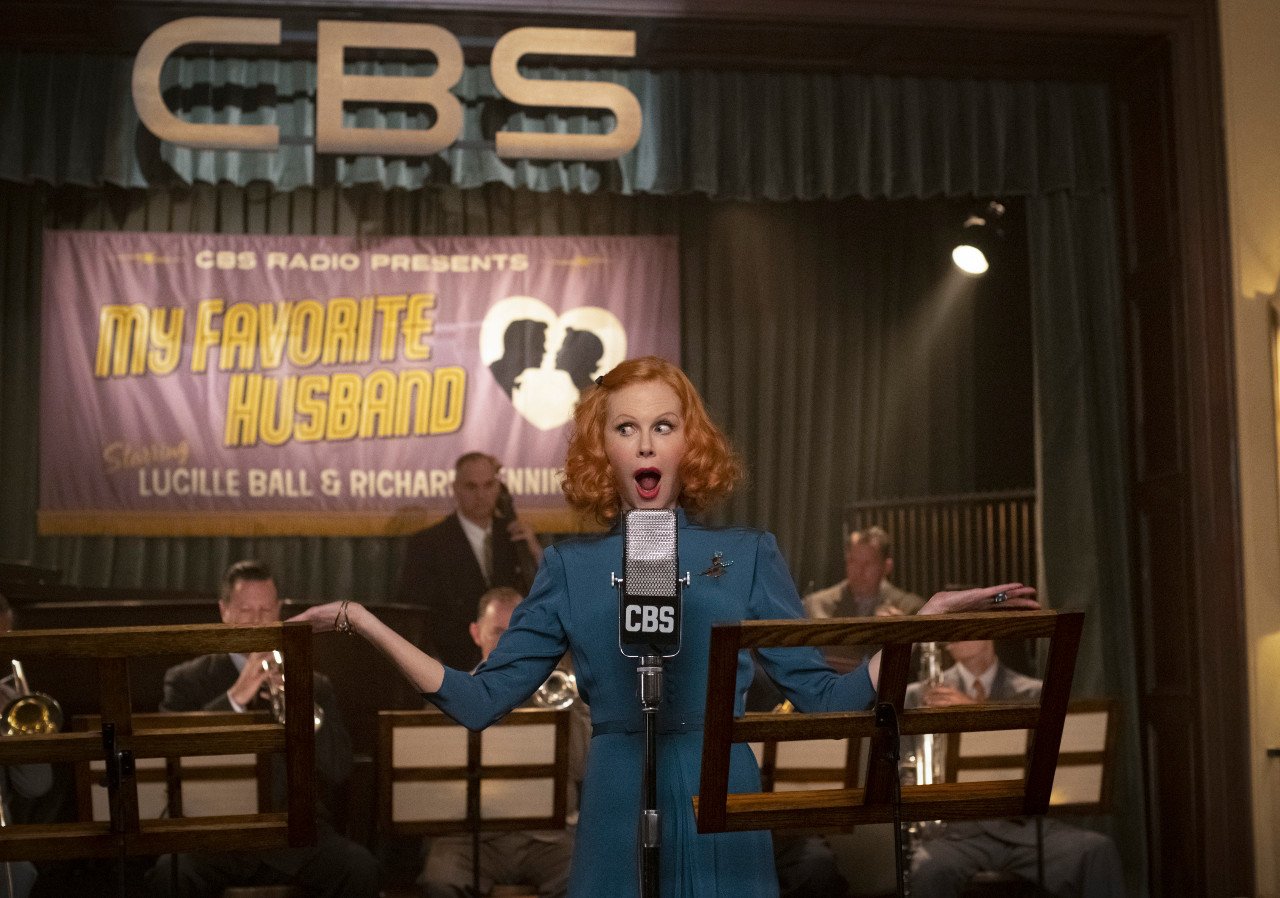Being the Ricardos: Aaron Sorkin’s Snappy I Love Lucy Biopic Soars on Novel Approach
By Kim Hughes
Rating: A
Not exactly a traditional biopic but thoroughly absorbing and provocative, writer/director Aaron Sorkin’s hotly anticipated drama Being the Ricardos charts a week in the life of 50s-era television stars and real-life spouses Lucille Ball and Desi Arnaz — played not without controversy by Nicole Kidman and Javier Bardem — as an unfolding crisis (actually a few of them) put their personal and professional relationships on the line.
Indeed, Sorkin’s film, which predictably crackles with snappy dialogue, is a bit of a hodgepodge genre-wise, but one that works, using I Love Lucy, the show, as the sun around which everything else spins.
Being the Ricardos opens like a documentary, with former I Love Lucy staffers (actually actors, including Linda Lavin) offering what appear to be near-present-day anecdotes about the show in its heyday and its dazzlingly watchable stars, who enlivened classic TV characters Lucy and Ricky Ricardo, she the zany would-be famous housewife, he the suave Cuban-born musician and bandleader.
The story immediately homes in on their career nadir. Gossip columnist Walter Winchell has reported that Lucille Ball is a card-carrying member of the Communist Party, which in 1950s America is a bit of a problem, especially if you are on TV. The bigger problem is that, technically, it’s true.
In 1936 when she was 24, Ball registered to vote as a member of the Communist party in California to please her liberal grandfather. She promptly forgot all about it, and never actively supported the party or its dogma, but was eventually hauled before the U.S. House of Representatives Un-American Activities Committee in 1953. She was ultimately cleared of any affiliation or wrongdoing.
In Sorkin’s film, set in the immediate aftermath of that appearance, Winchell has broken the story and I Love Lucy’s cast, network, and sponsors are waiting for the proverbial other shoe to drop, while Arnaz — as a Cuban and naturalized American, as staunchly anti-Communist as they come — attempts to spin the idea that Lucy simply checked the wrong box on the ballot. But everything is at stake, and everybody knows it. Lesser careers have been ruined amid similar accusations.
The film follows the cast during a week of rehearsals in the lead-up to that week’s show as they wait for the media outcome, making detours backwards in time to chart Ball’s and Arnaz’s rise from radio and nightclubs, vaudeville, and film to one of the biggest television shows on the planet and cultural curators of the highest order. (Fun fact: their Desilu production company produced Star Trek and Mission: Impossible).
PROUDLY SUPPORTS ORIGINAL-CIN
There’s a lot to this story of course, all of it true; well, at least, as much as can be known about what goes on inside a marriage by anyone other than those in it. By-now familiar touchstones drive the narrative brilliantly: Lucy’s real-life pregnancy which she and Arnaz were determined to weave into the plot of the show even though even the word “pregnancy” was not uttered on TV at that time, much less depicted. And an American woman married to and pregnant by a Latin American, no less.
There was Ball’s perfectionism and refusal to compromise on scripts or anything else despite being the only woman in the boardroom. The film observes her complicated, competitive relationship with co-stars Vivian Vance and William Frawley (Nina Arianda and J.K. Simmons, both great) who played neighbours Fred and Ethel Mertz on the show but whose backstage impact is depicted here as much bigger.
We see Ball’s tireless championing of Arnaz and him of her despite the potentially parallel crisis of his womanizing, and the feminist spirit — even though nobody was calling it that yet — underpinning everything and everyone attached to I Love Lucy, save maybe sponsor Philip Morris.
Ball and Arnaz were profoundly astute and forward-thinking as producers, showrunners, and business people, and Sorkin’s script ensures those aspects get their due.
Much is made of the sheer breath and depth of Ball’s success, notably with I Love Lucy which at its peak, pulled in an astonishing 60 million viewers a week. Ball was the most famous — and for the week depicted here, potentially most infamous — woman in America at a time when fetching martinis and slippers for the husband was status quo.
Interestingly, both Kidman and Bardem are playing younger. In 1953, Lucy was 42, Desi was 36 (another taboo scorched; older woman, younger man). Kidman is 54 and Bardem is 52. Neither look much like the people they’re playing, as persnickety online chatter has noted, but both nail the vibe with Kidman acing Ball’s familiar vocal cadence and gestures.
Given the devotion Ball continues to inspire in fans, it was perhaps too great a challenge for anyone to live up to casting expectations. Still, Being the Ricardos hits all the right notes, making these larger-than-life people seem at once pointedly human and even more ground-breaking than ever.
Being the Ricardos. Written and directed by Aaron Sorkin. Starring Nicole Kidman, Javier Bardem, Nina Arianda and J.K. Simmons. In theatres December 10 and available on Amazon Prime December 21.



